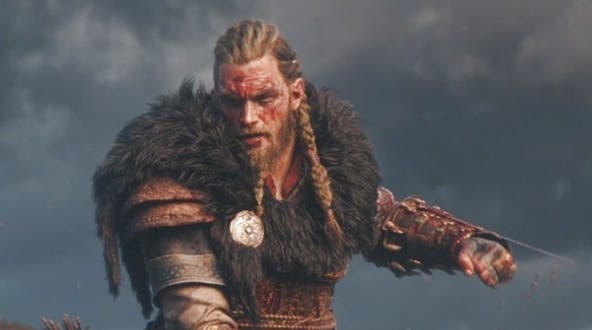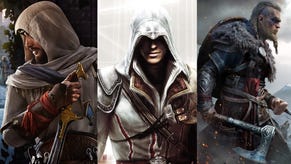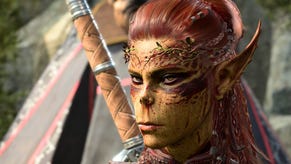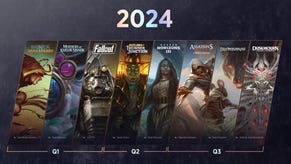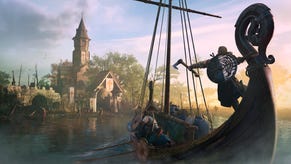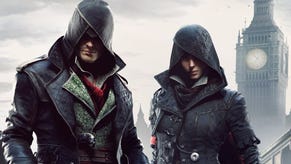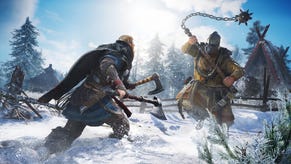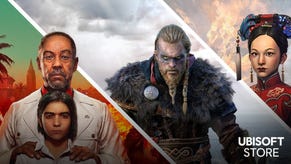Assassin's Creed Valhalla reshapes the series' RPG storytelling by giving you a Viking settlement
Ubisoft answers our questions on new hero Eivor, Viking Britain and much more.
Ubisoft knows what you think of Vikings: their reputation in history as bloodthirsty invaders, interested in Britain only to pillage its riches. And so, in today's reveal trailer for Assassin's Creed Valhalla, this version of history is addressed head on.
You see Vikings and their families spending some quiet, quality time together back home in Norway, where Valhalla's saga begins, and that things weren't so (Alfred the) Great in Britain either - where the majority of Valhalla actually takes place.
Of course, this first trailer barely scratches the surface of the game - and indeed how its portrayal of Vikings, Saxons and various other groups living in Britain will actually look (though actual footage arrives very soon). Will good old King Alf really be a moustache-twirling pantomime villain? No, lead producer Julien Laferrière assures me, as we settle down to talk Valhalla in detail. Will all Vikings be good guys? No, again. But what seems certain is how Valhalla has been entirely shaped by this principle Vikings were not only invaders but settlers as well. They were ferocious warriors, yes, but also a group of people with a rich culture, living gods and huge mythology - all of which Valhalla will explore in detail. Central to all that will be a new village settlement hub - a home for main character Eivor and their comrades, a familiar starting point for adventures and a place you'll see your decisions play out.
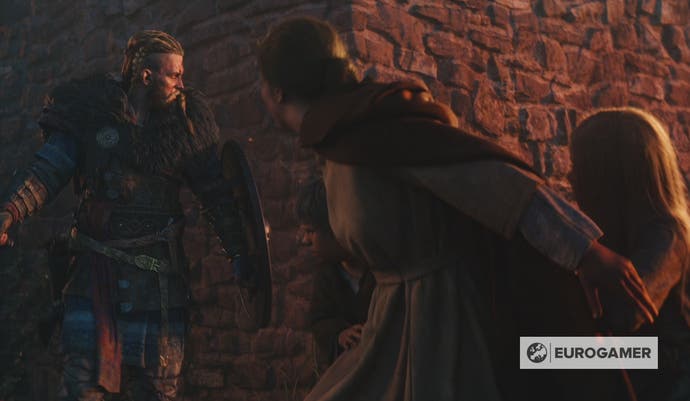
It's another adjustment for a series well past its early transition into RPG territory (Origins) and already able to boast about real mastery of the genre (Odyssey), one which feels like it will fill some of the few remaining blanks in that latter game's formula. So, instead of embarking on a never-ending journey to defog all the map, Valhalla's narrative is being built around your settlement, and through it. "It's your own Viking village you'll see prosper and grow, and which your clan mates will live in," Laferrière tells me via video call. "It's at the centre of our quests and the centre of the decisions you make. We want players to see the consequences of their actions." Big story arcs will begin and end here, the impact of your decisions rippling through your growing community. You'll see the effects of alliances - such as weddings to forge relationships between clans - and the consequences of "harsh choices you have to face". It's also where you'll see some of the game's romances play out (if you choose to indulge in those).
"It really changed the shape of the game we were making," Laferrière says. "Instead of exploring one territory, then moving on to another and having no real opportunity or reason to return, the settlement changes the structure. So you'll go on an adventure and then be encouraged to come back to your settlement. It changes the way we're playing the game we're making - at least, that's the bet we're making." It's not an entirely new concept for the franchise, but it's been a long time since Assassin's Creed tried to give players a proper home (boats and trains aside, AC3's rather basic Homestead is the last good example). It's also a tried and tested idea for the genre. As Laferrière speaks, he describes the settlement as a place of importance in Valhalla reminiscent of Skyhold and the Normandy, which players returned to time and again. As you grow your village, new buildings will be available to customise and upgrade such as a barracks, blacksmith and tattoo parlour.
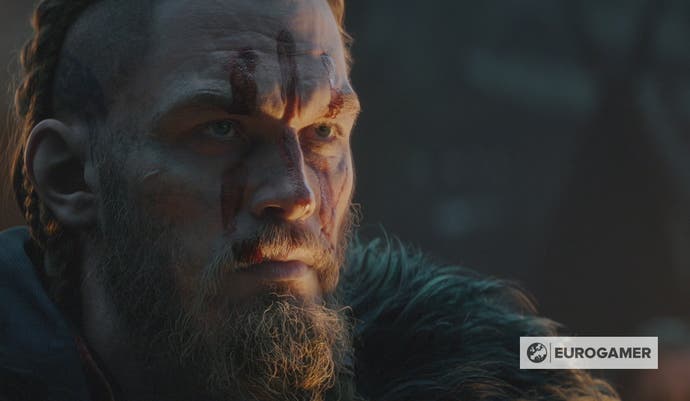
Yesterday's artwork strongly hinted at Valhalla's focus on Britain - something made clearer by today's trailer - and this is where Eivor's new home will be founded. But you can't have a Viking game without seeing Scandinavia, and Norway is the setting for the start of the game. "You have to understand where these people are coming from," Laferrière explains. "You'll feel the harshness of the lands, the political pressure there at the time. You'll feel all that and hopefully you'll understand why you have to move to England where most of the game takes place." Britain will then make up the bulk of the game's map, Laferrière adds, but "a few surprise areas" will also feature.
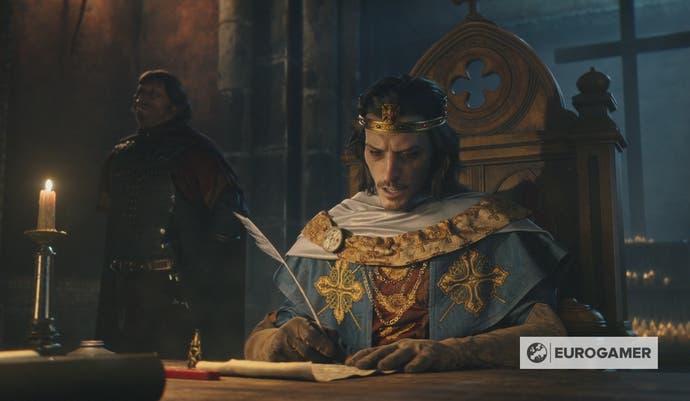
It's in Britain, of course, you'll eventually meet King Alfred, who the trailer paints as the villain of the piece, complete with some Templar-looking artefacts in the background. But Laferrière assures me that Alf will be more of a complex character when you meet him in-game. "He is shown in that [villainous] way in the trailer but over the course of the game you'll see there's a lot more nuance to him," I'm told. The game looks set to cover the Viking campaign against him (the one which led to him being on the run, burning cakes) and his eventual success at pushing the Norse back and unifying swathes of England. "Alfred the Great is a very important historical figure we want to treat right," Laferrière says. "And to do so it's all in the subtleties and nuances you'll find."
We haven't touched on Valhalla's main character Eivor in great detail, though partly this is due to Ubisoft avoiding plot spoilers and partly because, more than ever, I get the feeling we'll be crafting our own version of this hero as the story progresses. One thing the trailer doesn't tell you is that Eivor can be played as either male or female, and that your choice of gender is only part of the customisation you'll get. Beards, tattoos and war paint options will be available to pick from. Your gear will also be customisable, Laferrière says, as will your Viking longboat. (Oh, and you get a Viking longboat.) You can dual wield weapons, and shields make a return after people complained they were left out of Odyssey. Why does the trailer focus on the male version of Eivor only, I asked? The answer, as was the case with Odyssey's Kassandra and Alexios, is that the marketing will "showcase both at different points".
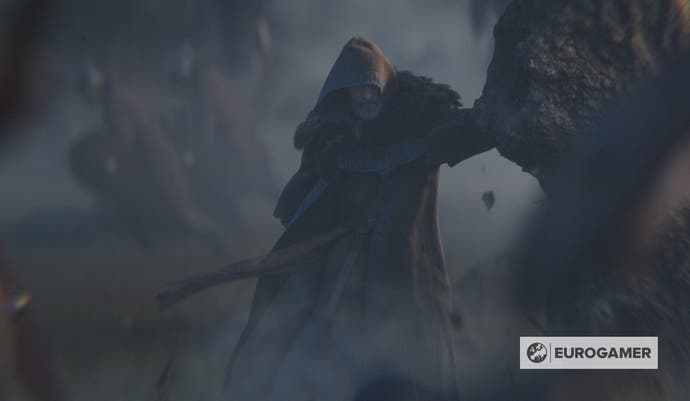
The other character in the trailer is the mysterious hooded figure which Eivor seems to associate with Norse god Odin - hanging around with a raven, the animal he is commonly linked with. Odyssey let players meet characters and creatures of Greek legend - and it seems like Valhalla will continue in this fold. "We're obviously using the mythology," Laferrière says. "We have found a cool way of integrating that with our lore which for today goes into major spoiler territory. But what I'll say is their gods were part of their daily life. They were believed to be roaming the earth, involved in fights - that was part of the Viking spirituality. And that's how we treat it in the game, which is true to beliefs and practices at the time."
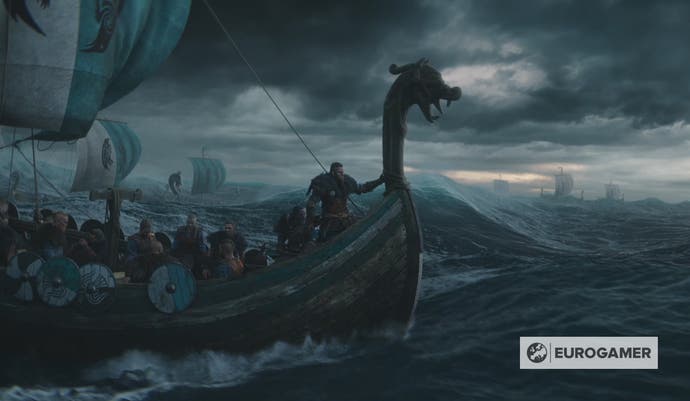
As for the raven, as many players have guessed, it will be your animal companion in Valhalla, just as eagles were in previous games. "We have a bunch of new abilities for the raven," Laferrière teases. "We used it as a reason to re-explore the way players can explore the world so it is less reliant on UI. If you notice a distraction somewhere it's probably because there's some content there." And if you thought having a home might mean less exploring the unknown this time around, it sounds like there will still be plenty of that too. "We want to make a world that rewards players for their curiosity. It links in with Vikings being great explorers - so the world is meant to be meaningful."
Once again, you'll be exploring both on land and on water, though it sounds like the naval battles of the past have been dialled back somewhat. There's no sitting and firing cannons at other boats - Vikings just didn't do that. Instead, your longships act as your fastest means of travel through the English countryside, along waterways which were the main roads of the era. Boats are also your fastest method of escape after launching an assault on a waterside fort. "Any military location you encounter on the rivers of England is fully raidable," Laferrière explains. "We want you to be playing the ultimate Viking fantasy, so you'll get to have your Viking buddies going with you on a longship. Sometimes you'll get resources to take back and upgrade your settlement, or maybe additional firepower to help take down higher level bandits in the region."
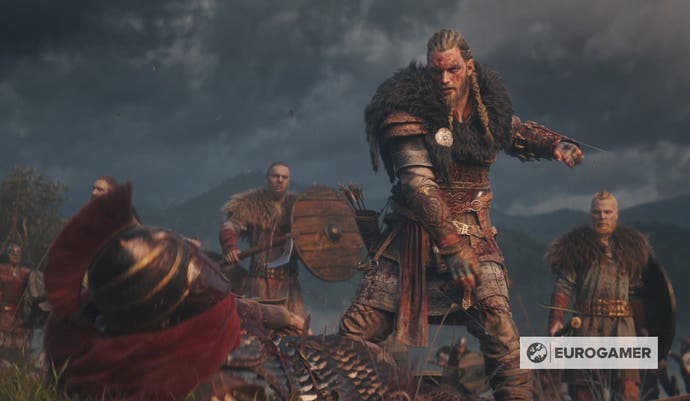
This mention of having friends along for the ride makes me wonder if there was any truth to rumours Valhalla might dabble with co-op play (which has not returned after a shaky effort in 2014's Unity). Ubisoft has confirmed to me this isn't the case - although some kind of interactivity seems to be on the cards. "Valhalla is a single player game," a Ubisoft spokesperson clarified, "with many online components, encouraging players to share their progress and creativity". One thing Ubisoft is willing to pin down for long-time fans is a continuation of the franchise's overall arc for those engaged in that - meaning more backstory on the First Civilisation, and a third outing for present day character Layla (whose story suddenly got interesting in Odyssey's final expansion). "We've found a way to blend the present day into a new type of experience for players," Laferrière concludes. "And present day is playable - I can confirm that."
For more than two and a half years, Valhalla has been in development by the Assassin's Creed Origins team at Ubisoft Montreal. Led by Ashraf Ismail, creative director of series standouts like Origins and Black Flag, it has also had the support of an eye-popping 14 other studios worldwide. It's a monumental project, designed from scratch to debut on PC, PlayStation 5 and Xbox Series X later this year (along with versions for PS4, Xbox One and Stadia). And it looks ready, again, to redefine what Assassin's Creed can be.
